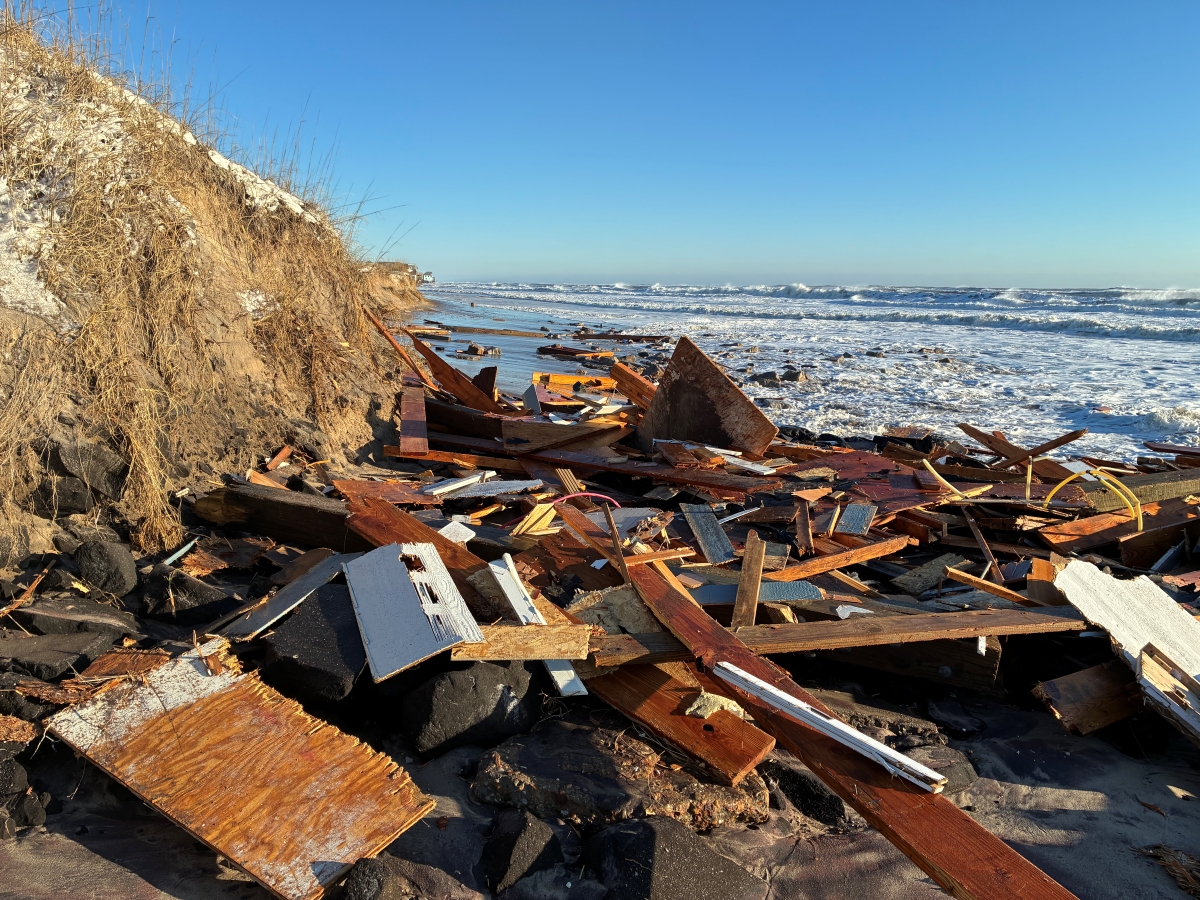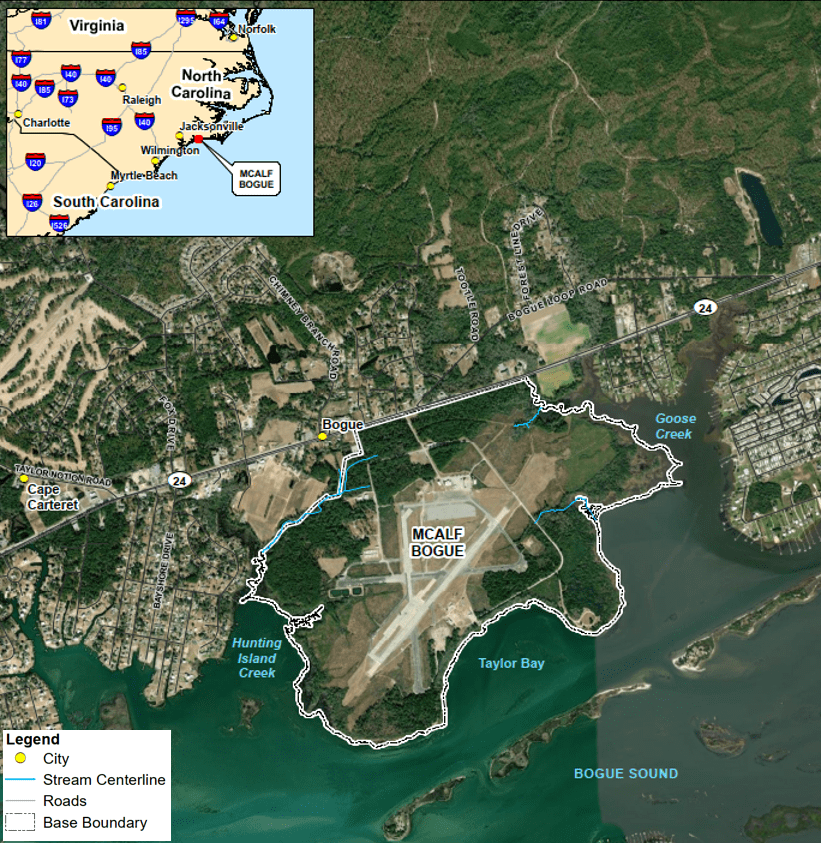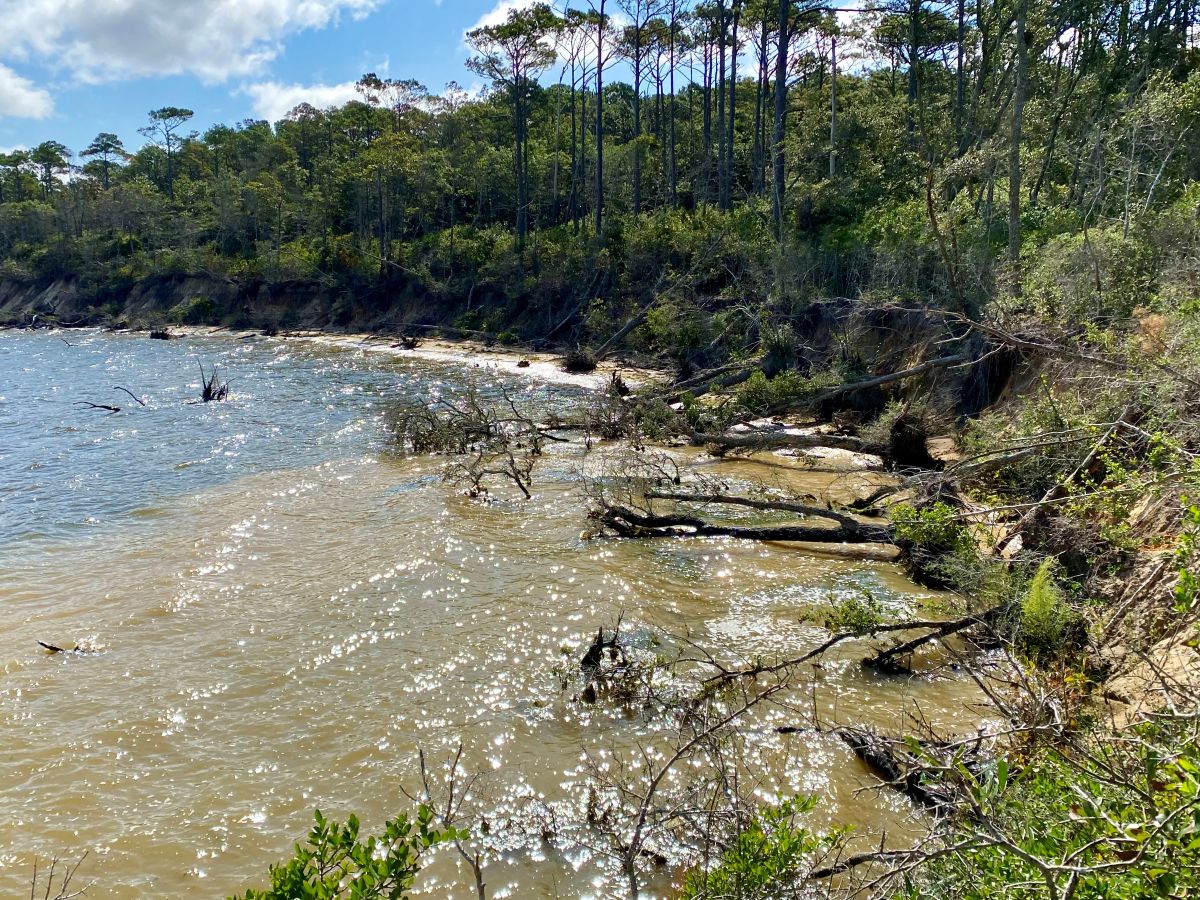N.C. COAST — In the United States, 500 million straws are used every day, according to Plastic Ocean Project.
That’s about 182.5 billion pieces per year of non-recyclable, single-use plastic accumulating in oceans and landfills, contributing to the litter problem or harming wildlife.
Supporter Spotlight
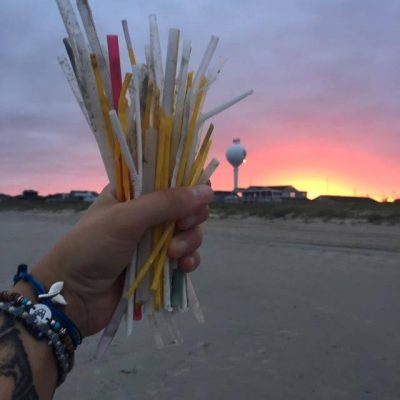
And countless numbers of these straws are found on North Carolina beaches.
During the last few years, several conservation and environmental organizations have been trying to eliminate this type of single-use plastic at its source with the Ocean Friendly Establishments initiative.
Working together on the Ocean Friendly Establishments campaign to encourage restaurants to only serve plastic straws upon request are the following: Plastic Ocean Project Inc.; Wrightsville Beach Keep It Clean; North Carolina Marine Debris Symposium; Surfrider Foundation’s Cape Fear, Bogue Banks and Outer Banks chapters; North Carolina Aquarium at Jennette’s Pier; University of North Carolina Wilmington Plastic Ocean Project; Crystal Coast and OBX Ocean Friendly Establishments; Ocean Conservancy; Keep Brunswick County Beautiful; Keep New Hanover Beautiful; and Penguin Radio Station 98.3.
When restaurants and other businesses become Certified Ocean Friendly Establishments, or OFEs, owners and managers have agreed to only serve straws upon request. Each restaurant or business is presented with a certificate to display its commitment to reduce plastic pollution.
The Ocean Friendly Establishments campaign is in line with this year’s Earth Day Network theme to “End Plastic Pollution.” Earth Day 2018, which is April 22, “is dedicated to providing the information and inspiration needed to fundamentally change human attitude and behavior about plastics,” according to the international organization’s website.
Supporter Spotlight
“Straws have been a huge concern for me ever since, because we find so many and because it seems like such an easy item to eliminate from the ever growing litter pile,” she wrote in 2016 about how she began Ocean Friendly Establishments. “I have been documenting about straws and I have also had conversations with town board members and beach businesses off and on since 2009.”
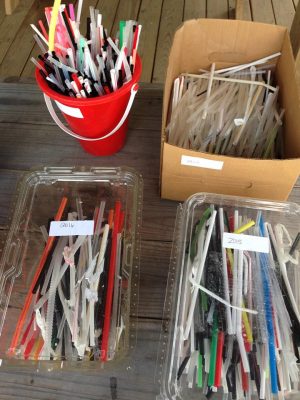
That sparked the idea to begin a campaign to approach businesses about reducing the number of straws used. She mentioned the idea to Bonnie Monteleone, founder of Plastic Ocean Project, who expressed her interest in helping with the campaign that is known today as Ocean Friendly Establishments. Plastic Ocean Project Inc. is a nonprofit organization working to address the global plastic pollution problem.
During the September 2014 North Carolina Marine Debris Symposium in Sneads Ferry, Bill Baggett of the Blockade Runner Beach Resort agreed to no longer serve straws unless requested at the resort, Taylor said.
Through 2015, progress was slow on getting more participating businesses but Taylor, Monteleone and Taylor’s friend Kim Beller were able to move forward with and establish the campaign, which she presented at the 2015 state Marine Debris Symposium to a receptive audience.
Today, certified Ocean Friendly Establishments can be found along the entire North Carolina coast.
Taylor told Coastal Review Online that the program has expanded to include sister campaigns, OBX Ocean Friendly Establishments in the Outer Banks and Crystal Coast Ocean Friendly Establishments that covers from about Swansboro to Cedar Island.
When Taylor reaches out to business owners about OFE, she said most are eager to learn about simple changes they can make to help protect our marine environment. “Many of the businesses we approach are already implementing measures to reduce plastic waste on their own, so becoming certified as an OFE is a no-brainer for those businesses.”
Taylor said that if someone has never heard about the problem of plastic pollution, they are surprised, and most are very receptive to ways they can help. “When I educate about ways to reduce plastic, such as saying, ‘no straw please,’ people who are aware of the plastic pollution and marine debris problem will often comment that they never even thought about straws as plastic pollution.”
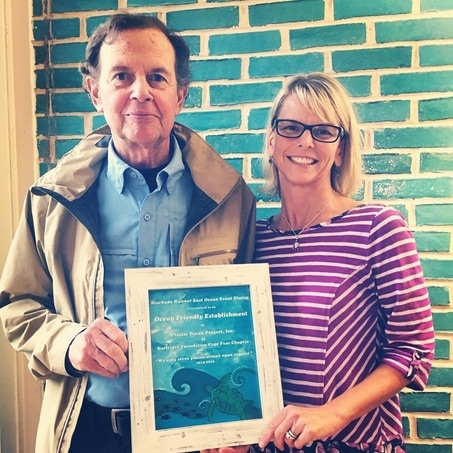
Taylor said that this campaign continues to be a collaborative effort between organizations and volunteers. “No one person has done this alone or could do this alone. We are grateful to all who contribute.”
Crystal Coast OFE lead volunteer Jessica Holleman, who owns her own acupuncture business in Morehead City, became involved in the program after coming across the Cape Fear OFE’s social media posts about some of her favorite restaurants in Wilmington being Ocean Friendly Establishments.
At the time, Holleman was working for La Perla Restaurant & Bar, which was in Morehead City but has moved to downtown Beaufort. Holleman said she mentioned it to the owners and they decided they wanted to go for certification. “And it all kind of happened from there.”
Holleman said the Crystal Coast chapter is working to have as many establishments as possible from Swansboro to Cedar Island reduce straw use by becoming certified Ocean Friendly Establishments.
There are currently more than a dozen in the area and many of the certified establishments go above and beyond by offering biodegradable to-go containers and to-go cups as well, she said.
“From there we hope to move into creating a to-go ware bank, buying mass quantities in bulk to get the cost down,” she said. “The bank will allow restaurants to buy the biodegradable options at lower cost, hopefully as low as their less eco-friendly options, Styrofoam for example. This will be especially helpful for the smaller local restaurant.”
To help spread the word, Holleman said anyone who goes to a restaurant can volunteer just by placing information printed on paper the size of a business card explaining the goals of OFE in the bill when they leave. Cards can be picked up at the Coastal Community Market, 606 Broad St., Beaufort, and Crystal Coast Waterkeeper office, 700 Arendell St., Morehead City.
Jessica Murphy, owner of La Perla restaurant, said she and Chef Kevin Davis are very committed to the Ocean Friendly Establishments program.
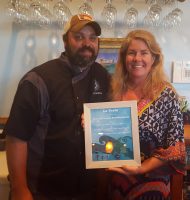
“We’re very passionate about conservation and sustainable seafood,” Murphy said. “It makes sense to be a responsible business at the beach, and it’s easy. Use paper straws, biodegradable to-go boxes and replace any plastic with china. We don’t offer plastic forks and we only offer plastic bags on very large orders.”
Murphy added that La Perla only serves sustainable seafood, as well.
“When a fish gets very popular, like grouper, they begin to get overfished, so Kevin, our chef, introduces lesser known varieties like grunt, tilefish, and various snappers.”
New to the Ocean Friendly Establishments program is the Outer Banks initiative. Nearly 20 establishments from Corolla to Nags Head have joined in the past month.
Sam Burdick, Plastic Ocean Project ambassador, said the Outer Banks Brewing Station was the first to be certified.
“They (the brewing station owners) had actually reached out to our team in the Wilmington area to become certified. There are now over 20 certified establishments on the Outer Banks,” she said. “I was able to get Jennette’s Pier and OBX Surfrider on board to become official partners, and we’re building a group of volunteers to certify additional businesses.”
An Outer Banks native, Burdick is a graduate student at Duke Marine Lab in Beaufort studying coastal environmental management and a researcher at the North Carolina Coastal Reserve & National Estuarine Research Reserve. She’s also an outreach coordinator for the Duke Community Science Initiative, and a global ambassador for the Plastic Ocean Project.“I heard about the Ocean Friendly Establishments program and was very interested in becoming involved,” she said. “In light of the recent repeal of the OBX bag ban, I came up with the idea to expand the OFE program to all merchants and plastic bags. I was approved and have been involved in the certification process ever since.”
Burdick added that she thinks it’s important to note that this is really an incentive program to get businesses to reduce their consumption of single-use plastics.
“In exchange for their pledge to limit the use of straws or avoid plastic bags, or both, we provide a framed certificate for display and promote their business on our social media pages and websites. It’s really a win-win,” she said.
Applications to become an Ocean Friendly Establishment are available on the organization’s website as well as the list of participating restaurants.



